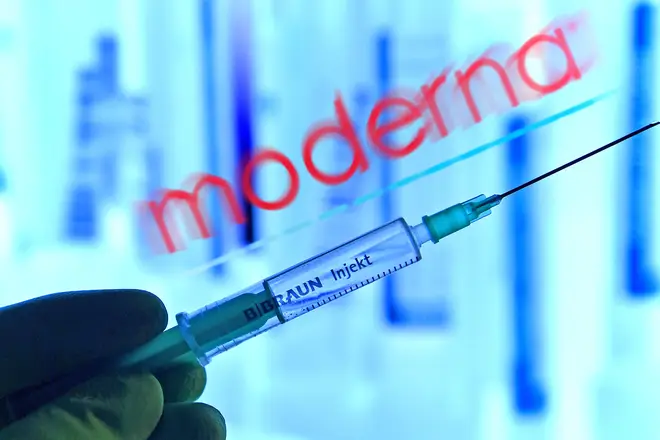
Vanessa Feltz 3pm - 6pm
30 November 2020, 18:53 | Updated: 3 December 2020, 13:15

Moderna is filing for emergency regulatory approval of its coronavirus vaccine in the US and Europe after final trials showed no serious safety concerns.
The vaccine was 94.1 per cent effective at protecting people from the disease, according to the latest analysis, while efficacy against severe Covid-19 was 100 per cent.
There was also no evidence the vaccine is less effective in older people.
Moderna announced the results on Monday and says it now plans to request emergency use authorisation from the US Food and Drug Administration (FDA).
The company is also applying for a conditional marketing authorisation with the European Medicines Agency (EMA) and plans to progress with the rolling reviews which have already been initiated with international regulatory agencies.
The UK has secured seven million doses of the jab, enough for 3.5 million people.
Moderna said analysis of the phase three COVE study of the vaccine candidate, called mRNA-1273, involved 30,000 participants including 196 cases of Covid-19.
It added the jab is generally well tolerated with no serious safety concerns identified to date.
Stephane Bancel, chief executive of Moderna, said: "This positive primary analysis confirms the ability of our vaccine to prevent Covid-19 disease with 94.1 per cent efficacy and importantly, the ability to prevent severe Covid-19 disease.
"We believe that our vaccine will provide a new and powerful tool that may change the course of this pandemic and help prevent severe disease, hospitalisations and death."
Of the 196 cases the analysis was based on, 185 cases of Covid-19 were observed in the placebo group, versus 11 cases observed in the vaccinated group. This resulted in a point estimate of vaccine efficacy of 94.1 per cent.
A secondary endpoint analysed severe cases of the virus and included 30 severe cases. All 30 cases occurred in the placebo group and none in the vaccinated group.
The company said there was one Covid-19-related death in the study to date, which occurred in the placebo group.
Moderna reports that efficacy was consistent across age, race and ethnicity, and gender demographics. The 196 coronavirus cases included 33 adults aged 65 and over, and 42 participants identifying as being from diverse communities.
Based on prior analysis, the most common adverse reactions included injection site pain, fatigue, myalgia (muscle pain), arthralgia (joint pain), headache, and redness at the injection site.
While the Government has secured seven million doses of the Moderna vaccine, it is not expected to be rolled out in the UK until the spring.
In the meantime the NHS is preparing to start rolling out a Covid-19 vaccine from next month.
The UK has placed orders for 100 million doses of the vaccine from from AstraZenca and Oxford University – enough to vaccinate most of the population – with a rollout expected in the coming weeks if the jab is approved by regulators.
Oxford data indicates the vaccine has 62 per cent efficacy when one full dose is given followed by another full dose, but when people were given a half dose followed by a full dose at least a month later, its efficacy rose to 90 per cent.
The combined analysis from both dosing regimes resulted in an average efficacy of 70.4 per cent.
The Government also has orders for 40 million doses of the jab from Pfizer and BioNTech, which has been shown to be 95 per cent effective.
Dr Michael Head, senior research fellow in global health at the University of Southampton, said: "These revised findings are very much in line with those previously announced by Moderna.
"This is essentially good news, in that there continues to be a very high level of observed effectiveness, with this effectiveness consistent across older populations and ethnic minorities.
"There were also no serious adverse events caused by the vaccine.
"We must of course reserve a little caution as we await the final published results but for now we can retain the existing optimism that this new generation of vaccines may be deployed in the near future."